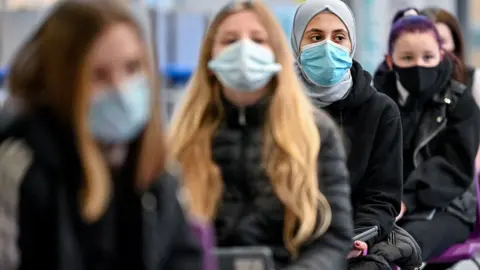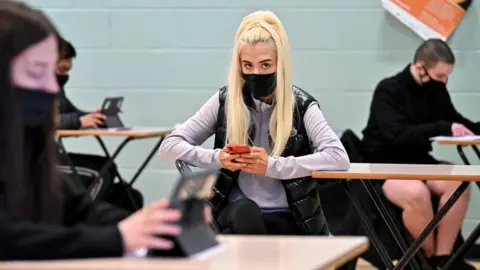Covid in Scotland: Self-isolation of whole classes 'no longer routine'
 Getty Images
Getty ImagesThe blanket self-isolation of whole classes following a positive Covid test will no longer be "routine", First Minister Nicola Sturgeon has said.
She told MSPs children identified as close contacts would not have to isolate if they tested negative.
However, teachers and secondary school pupils will still be asked to wear face coverings in classrooms for the first six weeks of the new term.
The policy on wearing masks in school buildings will be kept under review.
Ms Sturgeon said she was "acutely aware" that many young people found the mask policy difficult but she said experts considered it an "important protection" for people in schools.
The announcement was welcomed by unions but one parents' group said it was "unacceptable" that children would have to wear face coverings "considerably longer than almost any adult doing any job".
Most children returning to school later this month will not have been vaccinated, as only those who are aged 12 and over and at higher risk of falling ill from Covid are being offered the vaccine.
However, Ms Sturgeon said she was hoping updated advice from the UK's vaccine advisory group over the "next day or so" would recommend "going further" on the vaccination of young people.
She said she was "particularly concerned" to get 16 and 17-year-olds vaccinated.
In her update to a virtual Scottish Parliament, the first minister said carbon dioxide monitors - which asses how well-ventilated a space is - will also be required in schools and childcare settings.
And all school staff and secondary school pupils will be asked to take a lateral flow test one or two days before they return to school for the new term. They should then take them twice a week.


School restrictions are now tougher than those for the rest of society.
Secondary pupils have to wear a mask at all times and one metre distancing remains between adult staff.
Teachers were given a guarantee that no rules would change on day one but these current restrictions look set to remain for at least six weeks.
It shows a nervousness from the government about large groups of unvaccinated teenagers mixing when term starts - as early as next week for some.
The return of schools last August saw the beginning of an upward trend of cases. Ministers are hoping that holding their nerve now, keeping strict rules for pupils, will prevent history repeating.

Ms Sturgeon told the parliament that anyone who tests positive for Covid-19 would still be required to self-isolate but the rules around close contacts would change.
People aged 17 or over should get a PCR test and if it is negative there will be no requirement to self-isolate.
The same policy will apply to children aged between five and 17, while children aged under five will be "encouraged but not required" to take the test.
"This means that the blanket isolation of whole classes will no longer be routine," Ms Sturgeon said.
"Instead a more targeted approach will identify close contacts at highest risk of infection.
"So fewer young people will have to self-isolate, and most will be asked to self-isolate for a much shorter period of time."
It come after thousands of pupils had to isolate in the summer term - at one point in June there were more than 24,000 in self-isolation, only slightly lower than a peak of almost 30,000 last autumn.
 Getty Images
Getty ImagesMs Sturgeon said the new approach to self-isolation was important to minimise disruption to children's education.
But she said that the government's education advisory group has advised that other measures to mitigate the spread of Covid in schools were retained.
As well as wearing face coverings, staff will be asked to keep at least one metre from each other and from children while on the school estate.
Ms Sturgeon said: "The last year and a half has been difficult and stressful for children and young people, parents, and staff working in education settings. I am grateful to them for the understanding and cooperation shown.
"The new school and academic year will still have challenges - but I hope it will bring fewer disruptions, and allow a much more normal learning environment."
'Stew in masks'
Parents' group UFT Scotland said it was grateful for the change to isolation measures, but criticised the decision on face coverings.
"While nightclubs reopen and football fans flock in their thousands to stadiums across the country, kids will still have to stew in masks all day," organiser Jo Bisset said.
"This means children will be forced to wear coverings for considerably longer than almost any adult doing any job - that's unacceptable."
Meanwhile the EIS union welcomed the decision to broadly retain the same mitigations in school, as at the end of last term.
It said the voluntary vaccination of 12-17-year-olds "would be sensible and may go some way towards making schools safer places and help to address the anxieties of some people".


